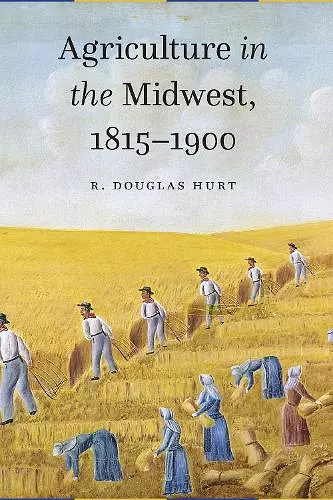Agriculture in the Midwest, 1815–1900
Format:Hardback
Publisher:University of Nebraska Press
Published:1st Jul '23
Currently unavailable, and unfortunately no date known when it will be back

2024 Jon Gjerde Prize Winner for best book in Midwestern History
After the War of 1812 and the removal of the region’s Indigenous peoples, the American Midwest became a paradoxical land for settlers. Even as many settlers found that the region provided the bountiful life of their dreams, others found disappointment, even failure—and still others suffered social and racial prejudice.
In this broad and authoritative survey of midwestern agriculture from the War of 1812 to the turn of the twentieth century, R. Douglas Hurt contends that this region proved to be the country’s garden spot and the nation’s heart of agricultural production. During these eighty-five years the region transformed from a sparsely settled area to the home of large industrial and commercial cities, including Chicago, Milwaukee, Cleveland, and Detroit. Still, it remained primarily an agricultural region that promised a better life for many of the people who acquired land, raised crops and livestock, provided for their families, adopted new technologies, and sought political reform to benefit their economic interests. Focusing on the history of midwestern agriculture during wartime, utopian isolation, and colonization as well as political unrest, Hurt contextualizes myriad facets of the region’s past to show how agricultural life developed for midwestern farmers—and to reflect on what that meant for the region and nation.
"Agriculture in the Midwest, 1815–1900 is a work of meticulous historical research. Exceptionally well written, organized and presented, Agriculture in the Midwest, 1815–1900 is especially and unreservedly recommended for community and college/university library 19th Century American History collections and supplemental curriculum studies lists."—Midwest Book Review
"Agriculture in the Midwest, 1815–1900 is a significant survey of Midwestern agricultural history from the early Republic years through the Civil War, Reconstruction, and the country's industrial turn. The book will inspire students and scholars alike to rethink the value of place and region in the stories we tell, teach, and write."—David D. Vail, Missouri Historical Review
"Hurt's book is filled with facts and details for farm enthusiasts as well as historians and fiction writers who don't overlook the men and women who plowed and planted the Midwest."—Johnny D. Boggs, Roundup Magazine
"This book is of great interest to anyone who wants to advance midwestern or agricultural history. It will help such readers clearly see the revival choice before them."—Michael M. Belding, Annals of Wyoming
“No one has understood this highly complex region during this transformative nineteenth century better than Douglas Hurt, the dean of American agricultural historians. This book is of immense importance for scholars, specialists, and non-specialists alike. In this synthesis of the literature Hurt demonstrates his mastery of both the old agricultural history and the new rural history. It is a tour de force by any measure.”—David Vaught, author of The Farmers’ Game: Baseball in Rural America
“Douglas Hurt, one of the brightest lights in the expanding constellation of midwestern studies, has produced another classic by chronicling the foundational role of yeoman farming in the development of the American Midwest. It will be a critical text for the new midwestern history.”—Jon K. Lauck, editor in chief of Middle West Review
“No one knows more than Douglas Hurt about agriculture in the Midwest. Each of these chapters is replete with facts and insights that at once illuminate the region’s agricultural past and underscore its importance to American development more broadly in the nineteenth century. Hurt demonstrates a remarkable command of primary and secondary sources relating to the topics treated, and his historical judgment is fair and balanced. This book is authoritative and will prove of lasting value.”—Peter Coclanis, author of The Shadow of a Dream: Economic Life and Death in the South Carolina Low Country, 1670–1920
ISBN: 9781496233493
Dimensions: unknown
Weight: unknown
448 pages